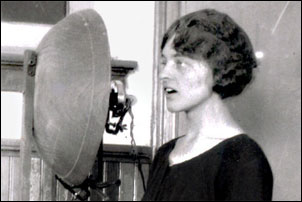Note: This article is over a year old and information contained in it may no longer be accurate. Please use the contact information in the lower-left corner to verify any information in this article.
89.3 WCAL celebrates an important 80th anniversary
May 7, 2002
It is the fall of 1918, and memories of World War I are still fresh. Five physics students and their professor assemble in the basement of the St. Olaf Chapel to experiment in the new field of "wireless." They build an apparatus for sending and receiving code messages, then string a single-wire aerial from the roof of the chapel to the roof of Old Main. In the middle of the night, they send messages that collect answers from as far away as New Zealand.
 89.3 WCAL was awarded its broadcasting license 80 years ago this month. The station premiered with two programs a week ? and distinctly different technology. A wooden chopping bowl was put into service as a microphone reflector. The bowl was memorialized in this photo ca. 1923, taken when WCAL aired a special dedication program featuring Gertrude Boe, a soprano soloist with the St. Olaf Choir. (Photo courtesy of the Shaw-Olson Center for College History, where the bowl is safely ensconced.) |
The culmination of those inspired experiments was the granting of a broadcasting license in May 1922. Station 9YAJ officially became WCAL on the AM dial. The station premiered with two programs a week, one of phonograph selections and one of presentations by college speakers and musicians. Also in 1922, Shakespeare's As You Like It -- from St. Olaf College -- became the first play broadcast on radio.
Not long afterward, when a lack of funds threatened the viability of the station, listener support sprang up. The Northfield News solicited donations to keep WCAL on the air, and soon gifts began to arrive from as far away as Montana. Through this effort, WCAL became America's first listener-supported station.
To this day, listener support remains WCAL's largest and most important source of revenue, with more than 9,000 members contributing annually.
WCAL, at 770 AM, built steadily on its successes. News, worship services in many languages, the first play-by-play sportscast, wartime broadcasts and pioneering political coverage all became part of the mix.
But the staple was always music of the highest quality possible. From the lieder that soprano Gertrude Boe sang into a microphone reflector improvised from a wooden salad bowl to Yo-Yo Ma's exquisitely performed cello concertos transmitted through a digital audio stream -- substantive, stimulating music has been the mainstay of WCAL's programming all along.
Under the continuing, inspired direction of Milford Jensen, 770 AM gave birth to 89.3 WCAL in 1968. The new Corporation for Public Broadcasting, in 1971, picked 90 American stations for their balance, educational strength and facilities to form National Public Radio. WCAL was one of them. In 1984, 24-hour broadcasting began. With manager Paul Peterson spearheading the effort, 1991 saw a new tower that made 89.3 available to the entire Twin Cities region. That, in turn, led to WCAL's current audience of 100,000 loyal listeners.
On May 16, 1922, WCAL received its broadcasting license and call letters. Throughout 2002, 89.3 WCAL is celebrating this 80th anniversary. As it does so, General Manager John Gaddo and 89.3 staff, board and college friends contemplate the next 80 years. Just over the horizon is digital FM broadcasting, which promises even better broadcast quality. Other visions include enhanced Internet programming at wcal.org and increased audience size.
Most important, WCAL will continue to dedicate itself to what it does best -- playing exquisite classical music in a down-to-earth manner and providing listeners with distinctive reporting on arts-and-cultural events in the Twin Cities area.
As Top of the Day host Steve Staruch says: "Stay tuned; good things are ahead."
